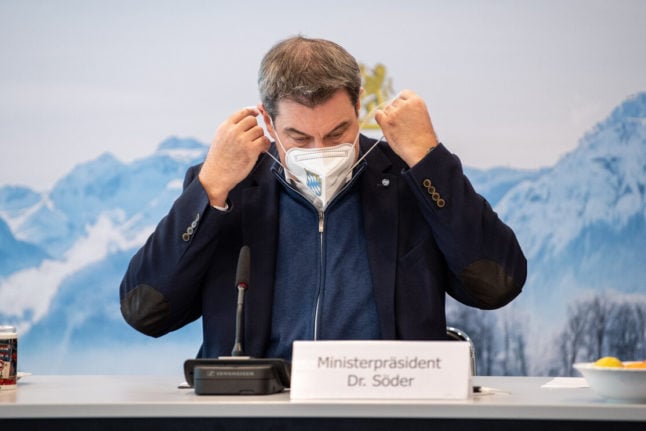From Wednesday, Bavarians will be asked to stay home unless they have a valid reason such as grocery shopping or visiting a doctor, state premier Markus Soeder told a press conference.
“The situation is unfortunately serious … We must do more, we must act,” Soeder said, after insisting that a national partial shutdown introduced in early November was not enough.
Under a so-called “lockdown light”, cultural and sporting facilities as well as restaurants and bars have been shut, with public gatherings limited but schools and shops remaining open.
Chancellor Angela Merkel and the leaders of Germany's 16 states agreed this week to extend the partial shutdown until January 10.
But under Germany's federal system, each state ultimately has the right to decide whether to impose the rules.
Soeder said a curfew will now apply in Bavaria after 9:00 pm (2000 GMT) in so-called hotspots with more than 200 new virus cases per 100,000 inhabitants per week.
Online lessons
Schools will be asked to switch some lessons online for older age groups, while those in hotspots will need to move all teaching online for older students.
The number of new infections in Germany has plateaued in recent weeks, with October's exponential growth brought to a halt.
But the number of infections remains high, with total case numbers passing the one-million mark last week and new cases regularly topping 20,000 a day.
The number of Covid-19 patients in intensive care nationwide has soared from just over 360 in early October to more than 4,000 currently.
The Robert Koch Institute (RKI) disease control centre reported 17,767 new Covid-19 infections within 24 hours on Sunday — a significant increase on last Sunday's 14,611 new cases.
Numbers are usually lower on Sundays because of a lag in reporting new cases over the weekend.
'Very tense'
RKI head Lothar Wieler said Thursday it was vital for new cases to start declining if the infection rate was to be brought under control.
“The situation remains very tense,” with numbers “not falling noticeably”, Wieler said.
He urged Germans to wear masks and practice social distancing seriously.
“We are not helplessly at the mercy of the virus,” he said.
National measures agreed by Merkel and state premiers restrict public gatherings to five people from two households, but envisage increasing the limit to 10 people over Christmas and New Year.
Soeder said this relaxation would apply in Bavaria only from December 23 to 26, with the tougher rules kicking back in for New Year's Eve.
Some states, including Thuringia and the city-state of Berlin, have introduced tougher rules for the Christmas period.
Soeder has won plaudits for his tough line in Bavaria since the start of the pandemic, often going it alone to introduce new rules that other states adopted later.



 Please whitelist us to continue reading.
Please whitelist us to continue reading.
Member comments